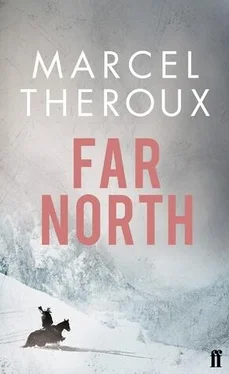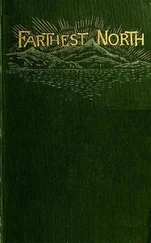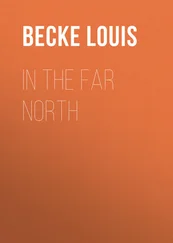The guards whistled at them and Tolya shook his gun and shouted at them to get along. He told them we’d be waiting for them at the same place in twenty-four hours.
Gradually, they moved off down the road in the middle, until pretty soon they were out of sight and only a few clouds of frozen breath hung in the air to tell you that anyone had passed that way.
Tolya stood watching them, almost motionless, just a couple of little bumps flexing on each side of his jaw as he clenched and unclenched his teeth.
Once the prisoners were out of sight, he was extra friendly to us. He pulled out cans of meat from one of his bags, some bottles of spirit from the still at the base, and a loaf of bread. There were ten cans and only eight of us, so he gave one of the tins to the Tungus boy. A couple of the guards weren’t keen on eating something so old, but when they saw the rest of us tucking in, and smelled that it was still good, they ate theirs up. The Tungus boy could only manage a little of his.
It was some kind of meat in jelly and it wasn’t to my taste either, but this didn’t seem the time to get finicky.
Tolya let a little spirit spill onto the snow ahen poured the rest into the tin cups each man had brought with him.
‘To the Zone,’ he said, and they all drank to the bottom, and sniffed their chunks of bread to take the taste away.
I put my cup down without tasting it, which a couple of them didn’t like. That was held to be bad luck, too — as was toasting with an empty cup, or leaving an empty bottle upright, or eating where you can see into a mirror, and too many others to list.
Stepan chided me, and called for my cup to be filled. His cheeks were greasy from the canned fat and his eyes had lit up from the drinking.
I covered the cup with my hand so they couldn’t add more, but I drank what I had so as to be comradely. It was the first time I’d touched alcohol for years.
They didn’t offer the boy any drink, though. It was too precious to be wasted on him.
When Tolya pulled out the second bottle, I decided I didn’t want to stick around there either drinking myself, or watching them get drunk. I got to my feet and dusted the snow off my pants.
‘Where are you off to?’ Tolya asked.
I explained that I wanted to cross the bridge and take a look round.
Tolya came apart from the others with me a little way and said not to go deeper than fifty yards on the other side. Something in his voice made me go suddenly alert. I wished I hadn’t had that drink.
There was the first notion of evening in the sky: the grey was heavier above us, and the shadows longer. We were standing out of earshot of the rest of them.
Tolya put his arm over my shoulders and turned me towards the far side of the bridge — not roughly, but forcefully enough that I knew he was serious. He pointed at a pair of lamp-posts on either side of the road to the downtown. ‘If you go any further than those, I can’t take you back with us. Do you understand?’
There was a peal of laughter from the huddle of men drinking.
He lowered his voice and his fingers gripped tight on the meat of my arm. ‘The city’s poisoned,’ he said. ‘No one leaves the Zone.’
I said that that was pretty harsh on the boys we’d sent in there.
He said nothing. It seemed like he had enough left in him of the old life to feel guilty about it. You could see he didn’t like what he’d been sent to do, but still, he was one of those lucky enough to make his own destiny, unlike the prisoners.
Stepan yelled at us to come back and join them.
I jerked my head towards the little drinking party behind us on the apron of the bridge. ‘Do they know what you’ve got planned?’
‘The ones who have been in before do. The others not yet.’
I guess something in my face betrayed what I was feeling.
‘Some are damned and some are saved,’ he said. ‘Be glad you’re one of the saved.’
Then he let my arm go anme to back to the others. He sang a dirty ballad in Russian and made a show of being light-hearted so as not jar the mood in the gathering. Their jokes and oaths followed me across the bridge.
I stepped over the concrete divider. The wind had swept the top of the camber clean of snow, and where it had drifted, it had been chased into curling shapes. Here and there, the prisoners’ feet had burst through the crust on top leaving tracks that were more like passing hooves than feet.
Be glad you’re one of the saved .
I’d been saved to see this, I thought: a city stripped of life, but kept intact by the power of the poison that had been spread on it; a dead place, but one that by its size and wealth might as well have been built by gods as men; a place that made a mockery of our patched clothes and our scavenged food. What kind of salvation was this?
*
I walked as far as the end of the bridge. Where I’d thought the prisoners had been resting, they’d been squatting. I suppose they were afraid to seek a more sheltered place, given the radiation they’d been warned about, but there was also something about the vastness of the city that made itself felt in your bowels. The few times I had to investigate a robbery — when robbery was a thing to be concerned about — the robbers had shat right in the open of the house they were stealing from. It looks like a gesture of contempt, but it was the fear and excitement of doing the crime that made them need to void themselves. And so with the robbers we’d sent. They’d fouled the streets of this once-dainty, once-plumbed city.
Their tracks led up the central avenue to wherever Apofagato’s map told them they should be heading. The trees and the big brick mansions crowded out the light, but fifty yards further on there was a break in the buildings, and the street lit up again. I could just make out furniture — chairs, tables, a dresser with its drawers gone — lying on its side in the snow, where it had spilled out of one of the buildings like the innards of a slaughtered animal. Much nearer than that, practically on the street corner, was a circular kiosk with some kind of posters glued to it that were too faint and far for me to read. I wished I’d had Tolya’s spyglass with me. Just as much as the paved road and the tall buildings, the tiny detail of the posters and the work they’d demanded (paper, ink, a press, gummed brushes) told a story about abundance and persistent ant-like industry.
*
By the time I got back to the others, the drinking had made them mellow.
They wanted to know what I’d seen, so I told them about the size of the city. From their curiosity and easy laughter, it seemed that Tolya hadn’t broken it to them yet that he intended us to kill the prisoners.
Hearing about the boulevards, and the furniture on the sidewalk, and the posters, they became reflective, and one or two of them expressed a wish to see it too, but Tolya told them it was already too dark and pulled out another bottle.
This one made them talkative, and they started to do a thing men rarely did in the camp unless you knew them very well. They talked about where they were from, their families, and their past lives.
Between them, they’d seen a lot of war and trouble. Exact"0em" widtalf of them had been soldiers of one kind or another. That was often the way of things. It seemed like the routine of soldiering fitted a man pretty well for life in the base.
One called Osip said his father had been an engineer and that he’d been with him once to Paris. That seized all our imaginations. It sounded like the most exotic place there was, and the other guards had a million questions about the food and the weather, and the women. But when they pressed him on it, he didn’t seem to know anything more about the place than the rest of us, or than someone could have got out of a book. He spoke in a tongue he claimed was French, but it could have been anything for all we knew.
Читать дальше












